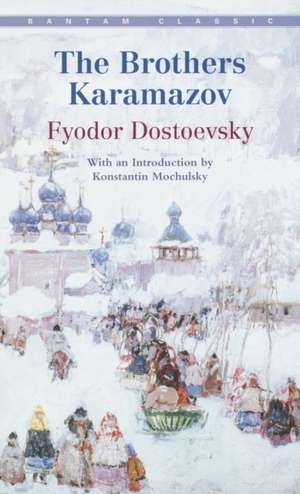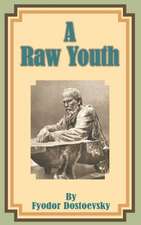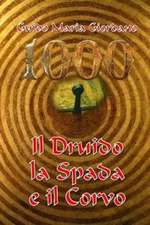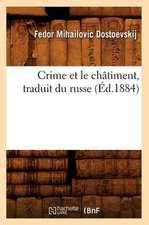The Brothers Karamazov: Bantam Classics
Autor Fyodor Mikhailovich Dostoevskyen Limba Engleză Paperback – 31 mar 1984 – vârsta de la 14 până la 18 ani
| Toate formatele și edițiile | Preț | Express |
|---|---|---|
| Paperback (4) | 48.85 lei 3-4 săpt. | |
| Bantam Classics – 31 mar 1984 | 48.85 lei 3-4 săpt. | |
| CREATESPACE – | 104.18 lei 3-5 săpt. | |
| CREATESPACE – 28 feb 2009 | 179.27 lei 3-5 săpt. | |
| Simon & Brown – 31 mar 2011 | 344.81 lei 38-45 zile | |
| Hardback (1) | 404.21 lei 38-45 zile | |
| – | 404.21 lei 38-45 zile |
Din seria Bantam Classics
-
 Preț: 39.98 lei
Preț: 39.98 lei -
 Preț: 35.46 lei
Preț: 35.46 lei -
 Preț: 32.91 lei
Preț: 32.91 lei -
 Preț: 33.77 lei
Preț: 33.77 lei -
 Preț: 29.86 lei
Preț: 29.86 lei -
 Preț: 32.09 lei
Preț: 32.09 lei -
 Preț: 34.03 lei
Preț: 34.03 lei -
 Preț: 36.91 lei
Preț: 36.91 lei -
 Preț: 31.42 lei
Preț: 31.42 lei -
 Preț: 30.66 lei
Preț: 30.66 lei -
 Preț: 36.04 lei
Preț: 36.04 lei -
 Preț: 27.22 lei
Preț: 27.22 lei -
 Preț: 42.88 lei
Preț: 42.88 lei -
 Preț: 33.19 lei
Preț: 33.19 lei -
 Preț: 38.76 lei
Preț: 38.76 lei -
 Preț: 36.63 lei
Preț: 36.63 lei -
 Preț: 44.30 lei
Preț: 44.30 lei -
 Preț: 41.84 lei
Preț: 41.84 lei -
 Preț: 33.60 lei
Preț: 33.60 lei -
 Preț: 31.26 lei
Preț: 31.26 lei -
 Preț: 32.08 lei
Preț: 32.08 lei -
 Preț: 42.06 lei
Preț: 42.06 lei -
 Preț: 35.46 lei
Preț: 35.46 lei -
 Preț: 32.53 lei
Preț: 32.53 lei -
 Preț: 40.01 lei
Preț: 40.01 lei -
 Preț: 39.17 lei
Preț: 39.17 lei -
 Preț: 51.30 lei
Preț: 51.30 lei -
 Preț: 33.35 lei
Preț: 33.35 lei -
 Preț: 34.83 lei
Preț: 34.83 lei -
 Preț: 40.59 lei
Preț: 40.59 lei -
 Preț: 37.51 lei
Preț: 37.51 lei -
 Preț: 33.60 lei
Preț: 33.60 lei -
 Preț: 39.55 lei
Preț: 39.55 lei -
 Preț: 39.66 lei
Preț: 39.66 lei -
 Preț: 28.61 lei
Preț: 28.61 lei -
 Preț: 46.77 lei
Preț: 46.77 lei -
 Preț: 28.04 lei
Preț: 28.04 lei -
 Preț: 37.92 lei
Preț: 37.92 lei -
 Preț: 47.89 lei
Preț: 47.89 lei -
 Preț: 34.42 lei
Preț: 34.42 lei -
 Preț: 44.52 lei
Preț: 44.52 lei -
 Preț: 32.64 lei
Preț: 32.64 lei -
 Preț: 35.89 lei
Preț: 35.89 lei -
 Preț: 34.01 lei
Preț: 34.01 lei -
 Preț: 31.96 lei
Preț: 31.96 lei -
 Preț: 31.31 lei
Preț: 31.31 lei -
 Preț: 39.57 lei
Preț: 39.57 lei -
 Preț: 58.13 lei
Preț: 58.13 lei -
 Preț: 33.05 lei
Preț: 33.05 lei
Preț: 48.85 lei
Nou
Puncte Express: 73
Preț estimativ în valută:
9.35€ • 9.76$ • 7.74£
9.35€ • 9.76$ • 7.74£
Carte disponibilă
Livrare economică 14-21 martie
Preluare comenzi: 021 569.72.76
Specificații
ISBN-13: 9780553212167
ISBN-10: 0553212168
Pagini: 1072
Dimensiuni: 108 x 176 x 45 mm
Greutate: 0.49 kg
Editura: Bantam Classics
Seria Bantam Classics
ISBN-10: 0553212168
Pagini: 1072
Dimensiuni: 108 x 176 x 45 mm
Greutate: 0.49 kg
Editura: Bantam Classics
Seria Bantam Classics
Notă biografică
Fyodor Dostoevsky's life was as dark and dramatic as the great novels he wrote. He was born in Moscow in 1821, and when he died in 1881, he left a legacy of masterworks that influenced the great thinkers and writers of the Western world and immortalized him as a giant among writers of world literature.
Extras
CHAPTER 1
FYODOR PAVLOVICH KARAMAZOV
ALexei Fyodorovich Karamazov was the third son of Fyodor Pavlovich Karamazov, a landowner in our district who became a celebrity (and is remembered to this day) because of the tragic and mysterious end he met exactly thirteen years ago, which will be described in its proper place. For the moment, I will only say of this "landowner" (as they referred to him here, although he spent hardly any time on his land) that he belonged to a peculiar though widespread human type, the sort of man who is not only wretched and depraved but also muddle-headed--muddle-headed in a way that allows him to pull off all sorts of shady little financial deals and not much else.
Fyodor Karamazov, for instance, started with next to nothing; he was just about the lowliest landowner among us, a man who would dash off to dine at other people's tables whenever he was given a chance and who sponged off people as much as he could. Yet, at his death, they found that he had a hundred thousand rubles in hard cash. And with all that, throughout his life he remained one of the most muddle-headed eccentrics in our entire district. Let me repeat: it was not stupidity, for most such eccentrics are really quite intelligent and cunning, and their lack of common sense is of a special kind, a national variety.
He had been married twice and had three sons--the eldest, Dmitry, by his first wife, and the other two, Ivan and Alexei, by the second.
Fyodor Karamazov's first wife came from a fairly wealthy family of landed gentry--the Miusovs--also from our district. Why should a girl with a dowry, a beautiful girl moreover, one of those bright, clever young things who in this generation are no longer rare and who even cropped up occasionally in the last--why should she marry such a worthless "freak," as they called him? I will not really attempt to explain. But, then, I once knew a young lady of the old, "romantic" generation who, after several years of secret love for a gentleman whom, please note, she could have peacefully married at any moment she chose, invented insurmountable obstacles for herself and, one stormy night, jumped from a steep, rather cliff-like bank into a fairly deep, rapid river and drowned, all because she fancied herself an Ophelia out of Shakespeare. Indeed, if the bank, on which she had had her eye for a long time, had been less picturesque or had there simply been a flat bank, it is conceivable that the suicide would never have taken place at all. This is a true story, and it must be assumed that in the past two or three generations quite a few similar incidents have occurred. In the same way, what Adelaida Miusov did was undoubtedly an echo of outside influences and also the act of exasperation of a captive mind. Perhaps she was trying to display feminine independence, to rebel against social conventions, against the despotism of her family and relatives, while her ready imagination convinced her, if only for a moment, that Fyodor Karamazov, despite his reputation as a sponger, was nevertheless one of the boldest and most caustic men of that "period of transition toward better things," whereas in reality he was nothing but a nasty buffoon. The fact that the marriage plans included elopement added piquancy to it, making it more exciting for Adelaida. Fyodor, at that time, would, of course, have done anything to improve his lowly position, and the opportunity to latch on to a good family and to pocket a dowry was extremely tempting to him. As for love, there does not seem to have been any, either on the bride's part or, despite her beauty, on Karamazov's. This was perhaps a unique case in Fyodor Karamazov's life, for he was as sensual as a man can be, one who throughout his life was always prepared, at the slightest encouragement, to chase any skirt. But his wife just happened to be the one woman who did not appeal to him sensually in the least.
Right after the elopement, Adelaida realized that she felt nothing but scorn for her husband. It quickly became obvious what married life was to be. Despite the fact that her family accepted the situation quite soon and gave the runaway bride her dowry, relations between husband and wife became an everlasting succession of quarrels. It was rumored that, in these quarrels, the young wife displayed incomparably more dignity and generosity than her husband, who, it was found out later, soon wheedled out of her every kopek of the twenty-five thousand rubles she had received, so that, as far as she was concerned, those thousands were sunk in deep waters never to be salvaged again. As to the little country estate and the quite decent town house that were also part of her dowry, he kept trying desperately to have them transferred to his name by some suitable deed; he probably would have succeeded because of the loathing and disgust his constant pleading and begging inspired in his wife, because she would do anything to have peace, sick and tired as she was of him; but luckily Adelaida's family intervened in time to put a stop to his greed.
People knew that husband and wife often came to actual blows and rumor had it that it was she who beat him, rather than he her. Indeed, Adelaida was a hot-tempered, bold, dark, and impatient lady endowed with remarkable physical strength.
Finally she eloped with a half-starved tutor, a former divinity student, leaving her husband with their three-year-old boy, Mitya.
Fyodor Karamazov immediately installed a regular harem in the house and indulged in the most scandalous drunken debauchery. But between one orgy and the next, he would drive all over the province complaining tearfully to all and sundry of Adelaida's desertion, and revealing on these occasions certain unsavory intimate details of their conjugal life that any other husband would have been ashamed to mention. He even seemed to enjoy--indeed, to feel flattered by--his ridiculous role as a cuckolded husband, for he insisted on describing his own disgrace in minute detail, even embellishing on it. "Why, Fyodor Pavlovich," people remarked, "you act as if an honor had been bestowed upon you. You seem pleased despite your sorrow." Many even added that he was delighted to have the role of clown thrust upon him, that he only pretended to be unaware of his ridiculous position in order to make it even funnier. But who can really tell? Possibly he was quite ingenuous about it all.
He finally succeeded in getting on the track of his runaway wife. It led to Petersburg where the poor thing had moved with her divinity student and where she had abandoned herself to a life of complete emancipation. Fyodor Karamazov immediately busied himself with preparations for the journey to Petersburg, and perhaps he would have gone, although he certainly had no idea what he would do there. But once he had decided to go, he felt that he had a special reason for plunging into a bout of unrestrained drunkenness--to fortify himself for the journey. And just at that time his in-laws received word that Adelaida had died in Petersburg. She died suddenly, in a garret, of typhus according to some, of starvation according to others. Karamazov was drunk when he learned of his wife's death, and some say he exclaimed joyfully, raising his hands to heaven: "Lord, now let Your servant depart in peace." But according to others, he wept, sobbing like a little boy so that people felt sorry for him despite the disgust he aroused in them. It is quite possible that they all were right, that he rejoiced in his regained freedom and wept for the woman from whom he had been freed, both at once. In most cases, people, even the most vicious, are much more naive and simple-minded than we assume them to be. And this is true of ourselves too.
CHAPTER 2
HE GETS RID OF HIS ELDEST SON
It is, of course, easy to imagine what sort of a father such a man would be, how he would bring up his children. And he lived up to expectation: he completely and thoroughly neglected his child by Adelaida. He did not do so out of any deliberate malice or resentment toward the child's mother, but simply because he forgot all about the little boy. And while he was pestering people with his tears and self-pitying stories, while he was turning his home into a house of debauchery, a faithful servant of the household, Gregory, took the three-year-old Mitya into his care. If it hadn't been for Gregory, there would have been no one to change the boy's shirt. Moreover, it so happened that the child's relations on his mother's side had also, at first, forgotten his existence. Mitya's grandfather, that is, Adelaida's father, Mr. Miusov, was no longer alive; his widow, Mitya's grandmother, had moved to Moscow and was in very poor health; and, in the meantime, Adelaida's sisters had married and moved away. So Mitya spent almost a year in Gregory's little house in the servants' quarters. And, even if his father had occasionally remembered him (he could not, after all, have been completely unaware of the child's existence), Karamazov would have sent his son back to the servants' quarters anyway, because a child would have been in the way during the orgies.
But one day a first cousin of Adelaida's returned from Paris. Peter Miusov, who was later to settle abroad permanently, was at that time still a young man, but he was already an exception among the Miusovs: he was an enlightened, big-city gentleman, glittering with foreign polish, a European through and through who, later in life, was to become a typical liberal of the 1840's and 1850's. In the course of his life, he came in contact with some of the most liberal minds of his era, both in Russia and abroad. He met Proudhon personally, as well as Bakunin, and, toward the end of his wanderings, liked best to tell of his experiences during the three days of the February Revolution of 1848 which he had witnessed in Paris, implying that he himself had taken part in it, just short, perhaps, of manning the barricades. This was one of the most gratifying recollections of his youth. He was a man of independent means, with an income from an estate of a thousand-odd souls, as property was evaluated in the old days. That splendid estate was located just outside our town and bordered on the lands of our famous monastery. No sooner had young Peter Miusov taken possession of his estate than he started an endless lawsuit against the monastery. It was something about fishing privileges or wood-cutting rights, I'm not sure which, but he felt that in suing "clericals" he was doing his duty as a citizen and an enlightened man.
When Miusov heard what had happened to Adelaida, whom he, of course, remembered, having even, at one time, taken a special interest in her, and when he learned of Mitya's plight, he decided to intervene, although that involved approaching Karamazov, whom Miusov loathed and despised with all the ardor of youth. This was the first time that he met Fyodor Karamazov; he told him point blank that he wished to take the boy and be responsible for his education. Later, he liked to tell at length what had happened at that meeting, because he felt it revealed a great deal about Karamazov's character. When Miusov first broached the subject of Mitya, the fellow stared at him blankly, as though he could not understand what child Miusov was talking about, and he seemed positively taken aback when reminded that he had a young son. And although Miusov's story may have been exaggerated, there was certainly an element of truth in it. It is a fact that all his life Karamazov liked to act the fool and assume all sorts of surprising roles; he would do so even when he had nothing to gain, indeed, even when it could be positively to his disadvantage, as in this instance. This is a quirk found in many people, even very clever ones, let alone the likes of Fyodor Karamazov.
Miusov at first went about the matter with some zest, and was even appointed Mitya's guardian (jointly with Karamazov), since the boy had, after all, the small estate and the town house coming to him as his inheritance from his mother. And he moved the boy to his house. But, not being tied down by a family of his own, just as soon as he had wound up his business in our town, which consisted of collecting the revenue from his estate, he went dashing off to Paris for a long stay. He left the boy in the care of a relative of his, a lady who lived in Moscow. Miusov settled in Paris for good and lost sight of Mitya, his interest in the boy petering out completely after the February Revolution, which made such an ineradicable impression on him. In the meantime, the Moscow lady died and Mitya passed into the care of one of her married daughters. I believe he had to change homes for a fourth time soon afterward. I won't expand on this topic here since I will have a great deal to say later about this first-born son of Fyodor Karamazov's, but I must supply a few facts right away, without which I could not even begin my novel.
First of all, Mitya--that is, Dmitry Fyodorovich Karamazov--was the only one of Fyodor Pavlovich Karamazov's sons who grew up under the impression that, however hard up he might be, he would, when he came of age, come into his inheritance from his mother and that he would then be financially independent. He was unruly as a boy and as a young man. He dropped out of the classical secondary school, but later was admitted to military school. From there he was sent on active duty with an army unit in the Caucasus, where he was given an officer's commission in the field. He was soon demoted to the ranks for fighting a duel, only to be restored to his rank again for gallantry. After this he led a wild, gay life that cost a good deal of money. Since, until he came of age, he never received a single kopek from his father, he was deep in debt by the time that day arrived. He only met and got to know the old man when he came to our town to demand an accounting of the estate left him by his mother. It would appear that, even then, Dmitry took a dislike to his father. He stayed at the paternal house only a short time, leaving as soon as he had managed to get a very small sum from the old man, together with some vague agreement about sending him the revenue from his estate. It must be noted here that on this occasion Dmitry failed to find out from his father what the total worth of his estate was or what income it yielded. Karamazov discovered right away (and this must be noted too) that his son had an erroneous and exaggerated notion of his inheritance, and this discovery pleased him for it fitted in with his own schemes. He realized that the young man was irresponsible, violent, passionate, unruly, impatient, and that he couldn't wait to satisfy all his whims and impulses. And Karamazov now knew how to handle Dmitry: the fellow could always be placated, at least temporarily, with small handouts. Karamazov proceeded immediately to exploit his son's weakness, putting him off with small sums. This went on for four years until, finally, Dmitry lost patience. He made a second appearance in town, this time to force on his father a final settlement of their accounts. He was quite stunned to hear from Karamazov that he had already received, in the many installments, a sum amounting to the value of his estate, that, if anything, it was he who was now in debt to his father, and that, moreover, in view of such and such an agreement which he himself had insisted upon at one point, he had renounced all further claims, etc., etc. The young man was dumbfounded, accused his father of cheating him, and acted as if he would go out of his mind.
FYODOR PAVLOVICH KARAMAZOV
ALexei Fyodorovich Karamazov was the third son of Fyodor Pavlovich Karamazov, a landowner in our district who became a celebrity (and is remembered to this day) because of the tragic and mysterious end he met exactly thirteen years ago, which will be described in its proper place. For the moment, I will only say of this "landowner" (as they referred to him here, although he spent hardly any time on his land) that he belonged to a peculiar though widespread human type, the sort of man who is not only wretched and depraved but also muddle-headed--muddle-headed in a way that allows him to pull off all sorts of shady little financial deals and not much else.
Fyodor Karamazov, for instance, started with next to nothing; he was just about the lowliest landowner among us, a man who would dash off to dine at other people's tables whenever he was given a chance and who sponged off people as much as he could. Yet, at his death, they found that he had a hundred thousand rubles in hard cash. And with all that, throughout his life he remained one of the most muddle-headed eccentrics in our entire district. Let me repeat: it was not stupidity, for most such eccentrics are really quite intelligent and cunning, and their lack of common sense is of a special kind, a national variety.
He had been married twice and had three sons--the eldest, Dmitry, by his first wife, and the other two, Ivan and Alexei, by the second.
Fyodor Karamazov's first wife came from a fairly wealthy family of landed gentry--the Miusovs--also from our district. Why should a girl with a dowry, a beautiful girl moreover, one of those bright, clever young things who in this generation are no longer rare and who even cropped up occasionally in the last--why should she marry such a worthless "freak," as they called him? I will not really attempt to explain. But, then, I once knew a young lady of the old, "romantic" generation who, after several years of secret love for a gentleman whom, please note, she could have peacefully married at any moment she chose, invented insurmountable obstacles for herself and, one stormy night, jumped from a steep, rather cliff-like bank into a fairly deep, rapid river and drowned, all because she fancied herself an Ophelia out of Shakespeare. Indeed, if the bank, on which she had had her eye for a long time, had been less picturesque or had there simply been a flat bank, it is conceivable that the suicide would never have taken place at all. This is a true story, and it must be assumed that in the past two or three generations quite a few similar incidents have occurred. In the same way, what Adelaida Miusov did was undoubtedly an echo of outside influences and also the act of exasperation of a captive mind. Perhaps she was trying to display feminine independence, to rebel against social conventions, against the despotism of her family and relatives, while her ready imagination convinced her, if only for a moment, that Fyodor Karamazov, despite his reputation as a sponger, was nevertheless one of the boldest and most caustic men of that "period of transition toward better things," whereas in reality he was nothing but a nasty buffoon. The fact that the marriage plans included elopement added piquancy to it, making it more exciting for Adelaida. Fyodor, at that time, would, of course, have done anything to improve his lowly position, and the opportunity to latch on to a good family and to pocket a dowry was extremely tempting to him. As for love, there does not seem to have been any, either on the bride's part or, despite her beauty, on Karamazov's. This was perhaps a unique case in Fyodor Karamazov's life, for he was as sensual as a man can be, one who throughout his life was always prepared, at the slightest encouragement, to chase any skirt. But his wife just happened to be the one woman who did not appeal to him sensually in the least.
Right after the elopement, Adelaida realized that she felt nothing but scorn for her husband. It quickly became obvious what married life was to be. Despite the fact that her family accepted the situation quite soon and gave the runaway bride her dowry, relations between husband and wife became an everlasting succession of quarrels. It was rumored that, in these quarrels, the young wife displayed incomparably more dignity and generosity than her husband, who, it was found out later, soon wheedled out of her every kopek of the twenty-five thousand rubles she had received, so that, as far as she was concerned, those thousands were sunk in deep waters never to be salvaged again. As to the little country estate and the quite decent town house that were also part of her dowry, he kept trying desperately to have them transferred to his name by some suitable deed; he probably would have succeeded because of the loathing and disgust his constant pleading and begging inspired in his wife, because she would do anything to have peace, sick and tired as she was of him; but luckily Adelaida's family intervened in time to put a stop to his greed.
People knew that husband and wife often came to actual blows and rumor had it that it was she who beat him, rather than he her. Indeed, Adelaida was a hot-tempered, bold, dark, and impatient lady endowed with remarkable physical strength.
Finally she eloped with a half-starved tutor, a former divinity student, leaving her husband with their three-year-old boy, Mitya.
Fyodor Karamazov immediately installed a regular harem in the house and indulged in the most scandalous drunken debauchery. But between one orgy and the next, he would drive all over the province complaining tearfully to all and sundry of Adelaida's desertion, and revealing on these occasions certain unsavory intimate details of their conjugal life that any other husband would have been ashamed to mention. He even seemed to enjoy--indeed, to feel flattered by--his ridiculous role as a cuckolded husband, for he insisted on describing his own disgrace in minute detail, even embellishing on it. "Why, Fyodor Pavlovich," people remarked, "you act as if an honor had been bestowed upon you. You seem pleased despite your sorrow." Many even added that he was delighted to have the role of clown thrust upon him, that he only pretended to be unaware of his ridiculous position in order to make it even funnier. But who can really tell? Possibly he was quite ingenuous about it all.
He finally succeeded in getting on the track of his runaway wife. It led to Petersburg where the poor thing had moved with her divinity student and where she had abandoned herself to a life of complete emancipation. Fyodor Karamazov immediately busied himself with preparations for the journey to Petersburg, and perhaps he would have gone, although he certainly had no idea what he would do there. But once he had decided to go, he felt that he had a special reason for plunging into a bout of unrestrained drunkenness--to fortify himself for the journey. And just at that time his in-laws received word that Adelaida had died in Petersburg. She died suddenly, in a garret, of typhus according to some, of starvation according to others. Karamazov was drunk when he learned of his wife's death, and some say he exclaimed joyfully, raising his hands to heaven: "Lord, now let Your servant depart in peace." But according to others, he wept, sobbing like a little boy so that people felt sorry for him despite the disgust he aroused in them. It is quite possible that they all were right, that he rejoiced in his regained freedom and wept for the woman from whom he had been freed, both at once. In most cases, people, even the most vicious, are much more naive and simple-minded than we assume them to be. And this is true of ourselves too.
CHAPTER 2
HE GETS RID OF HIS ELDEST SON
It is, of course, easy to imagine what sort of a father such a man would be, how he would bring up his children. And he lived up to expectation: he completely and thoroughly neglected his child by Adelaida. He did not do so out of any deliberate malice or resentment toward the child's mother, but simply because he forgot all about the little boy. And while he was pestering people with his tears and self-pitying stories, while he was turning his home into a house of debauchery, a faithful servant of the household, Gregory, took the three-year-old Mitya into his care. If it hadn't been for Gregory, there would have been no one to change the boy's shirt. Moreover, it so happened that the child's relations on his mother's side had also, at first, forgotten his existence. Mitya's grandfather, that is, Adelaida's father, Mr. Miusov, was no longer alive; his widow, Mitya's grandmother, had moved to Moscow and was in very poor health; and, in the meantime, Adelaida's sisters had married and moved away. So Mitya spent almost a year in Gregory's little house in the servants' quarters. And, even if his father had occasionally remembered him (he could not, after all, have been completely unaware of the child's existence), Karamazov would have sent his son back to the servants' quarters anyway, because a child would have been in the way during the orgies.
But one day a first cousin of Adelaida's returned from Paris. Peter Miusov, who was later to settle abroad permanently, was at that time still a young man, but he was already an exception among the Miusovs: he was an enlightened, big-city gentleman, glittering with foreign polish, a European through and through who, later in life, was to become a typical liberal of the 1840's and 1850's. In the course of his life, he came in contact with some of the most liberal minds of his era, both in Russia and abroad. He met Proudhon personally, as well as Bakunin, and, toward the end of his wanderings, liked best to tell of his experiences during the three days of the February Revolution of 1848 which he had witnessed in Paris, implying that he himself had taken part in it, just short, perhaps, of manning the barricades. This was one of the most gratifying recollections of his youth. He was a man of independent means, with an income from an estate of a thousand-odd souls, as property was evaluated in the old days. That splendid estate was located just outside our town and bordered on the lands of our famous monastery. No sooner had young Peter Miusov taken possession of his estate than he started an endless lawsuit against the monastery. It was something about fishing privileges or wood-cutting rights, I'm not sure which, but he felt that in suing "clericals" he was doing his duty as a citizen and an enlightened man.
When Miusov heard what had happened to Adelaida, whom he, of course, remembered, having even, at one time, taken a special interest in her, and when he learned of Mitya's plight, he decided to intervene, although that involved approaching Karamazov, whom Miusov loathed and despised with all the ardor of youth. This was the first time that he met Fyodor Karamazov; he told him point blank that he wished to take the boy and be responsible for his education. Later, he liked to tell at length what had happened at that meeting, because he felt it revealed a great deal about Karamazov's character. When Miusov first broached the subject of Mitya, the fellow stared at him blankly, as though he could not understand what child Miusov was talking about, and he seemed positively taken aback when reminded that he had a young son. And although Miusov's story may have been exaggerated, there was certainly an element of truth in it. It is a fact that all his life Karamazov liked to act the fool and assume all sorts of surprising roles; he would do so even when he had nothing to gain, indeed, even when it could be positively to his disadvantage, as in this instance. This is a quirk found in many people, even very clever ones, let alone the likes of Fyodor Karamazov.
Miusov at first went about the matter with some zest, and was even appointed Mitya's guardian (jointly with Karamazov), since the boy had, after all, the small estate and the town house coming to him as his inheritance from his mother. And he moved the boy to his house. But, not being tied down by a family of his own, just as soon as he had wound up his business in our town, which consisted of collecting the revenue from his estate, he went dashing off to Paris for a long stay. He left the boy in the care of a relative of his, a lady who lived in Moscow. Miusov settled in Paris for good and lost sight of Mitya, his interest in the boy petering out completely after the February Revolution, which made such an ineradicable impression on him. In the meantime, the Moscow lady died and Mitya passed into the care of one of her married daughters. I believe he had to change homes for a fourth time soon afterward. I won't expand on this topic here since I will have a great deal to say later about this first-born son of Fyodor Karamazov's, but I must supply a few facts right away, without which I could not even begin my novel.
First of all, Mitya--that is, Dmitry Fyodorovich Karamazov--was the only one of Fyodor Pavlovich Karamazov's sons who grew up under the impression that, however hard up he might be, he would, when he came of age, come into his inheritance from his mother and that he would then be financially independent. He was unruly as a boy and as a young man. He dropped out of the classical secondary school, but later was admitted to military school. From there he was sent on active duty with an army unit in the Caucasus, where he was given an officer's commission in the field. He was soon demoted to the ranks for fighting a duel, only to be restored to his rank again for gallantry. After this he led a wild, gay life that cost a good deal of money. Since, until he came of age, he never received a single kopek from his father, he was deep in debt by the time that day arrived. He only met and got to know the old man when he came to our town to demand an accounting of the estate left him by his mother. It would appear that, even then, Dmitry took a dislike to his father. He stayed at the paternal house only a short time, leaving as soon as he had managed to get a very small sum from the old man, together with some vague agreement about sending him the revenue from his estate. It must be noted here that on this occasion Dmitry failed to find out from his father what the total worth of his estate was or what income it yielded. Karamazov discovered right away (and this must be noted too) that his son had an erroneous and exaggerated notion of his inheritance, and this discovery pleased him for it fitted in with his own schemes. He realized that the young man was irresponsible, violent, passionate, unruly, impatient, and that he couldn't wait to satisfy all his whims and impulses. And Karamazov now knew how to handle Dmitry: the fellow could always be placated, at least temporarily, with small handouts. Karamazov proceeded immediately to exploit his son's weakness, putting him off with small sums. This went on for four years until, finally, Dmitry lost patience. He made a second appearance in town, this time to force on his father a final settlement of their accounts. He was quite stunned to hear from Karamazov that he had already received, in the many installments, a sum amounting to the value of his estate, that, if anything, it was he who was now in debt to his father, and that, moreover, in view of such and such an agreement which he himself had insisted upon at one point, he had renounced all further claims, etc., etc. The young man was dumbfounded, accused his father of cheating him, and acted as if he would go out of his mind.
Recenzii
“[Dostoevsky is] at once the most literary and compulsively readable of novelists we continue to regard as great . . . The Brothers Karamazov stands as the culmination of his art–his last, longest, richest, and most capacious book. [This] scrupulous rendition can only be welcomed. It returns us to a work we thought we knew, subtly altered and so made new again.” –Washington Post Book World
“A miracle . . . Every page of the new Karamazov is a permanent standard, and an inspiration.” –The Times (London)
“One finally gets the musical whole of Dostoevsky’s original.” –New York Times Book Review
“Absolutely faithful . . . Fulfills in remarkable measure most of the criteria for an ideal translation . . . The stylistic accuracy and versatility of registers used . . . bring out the richness and depth of the original in a way similar to a faithful and sensitive restoration of a painting.” –The Independent
“It may well be that Dostoevsky’s [world], with all its resourceful energies of life and language, is only now–and through the medium of [this] new translation–beginning to come home to the English-speaking reader.” –New York Review of Books
“Heartily recommended to any reader who wishes to come as close to Dostoevsky’s Russian as it is possible.” –Joseph Frank, Princeton University
With an Introduction by Malcolm V. Jones
“A miracle . . . Every page of the new Karamazov is a permanent standard, and an inspiration.” –The Times (London)
“One finally gets the musical whole of Dostoevsky’s original.” –New York Times Book Review
“Absolutely faithful . . . Fulfills in remarkable measure most of the criteria for an ideal translation . . . The stylistic accuracy and versatility of registers used . . . bring out the richness and depth of the original in a way similar to a faithful and sensitive restoration of a painting.” –The Independent
“It may well be that Dostoevsky’s [world], with all its resourceful energies of life and language, is only now–and through the medium of [this] new translation–beginning to come home to the English-speaking reader.” –New York Review of Books
“Heartily recommended to any reader who wishes to come as close to Dostoevsky’s Russian as it is possible.” –Joseph Frank, Princeton University
With an Introduction by Malcolm V. Jones






















